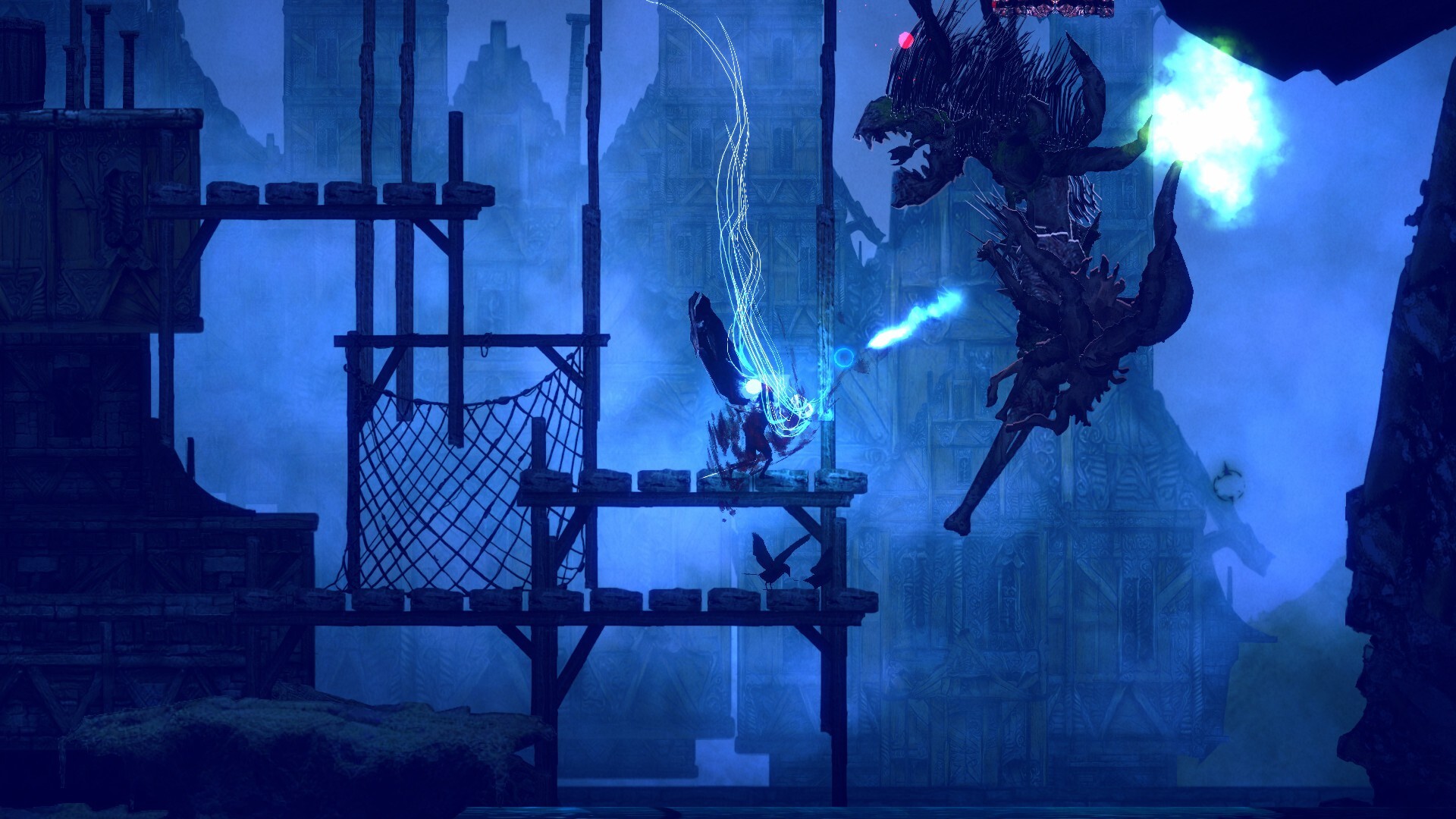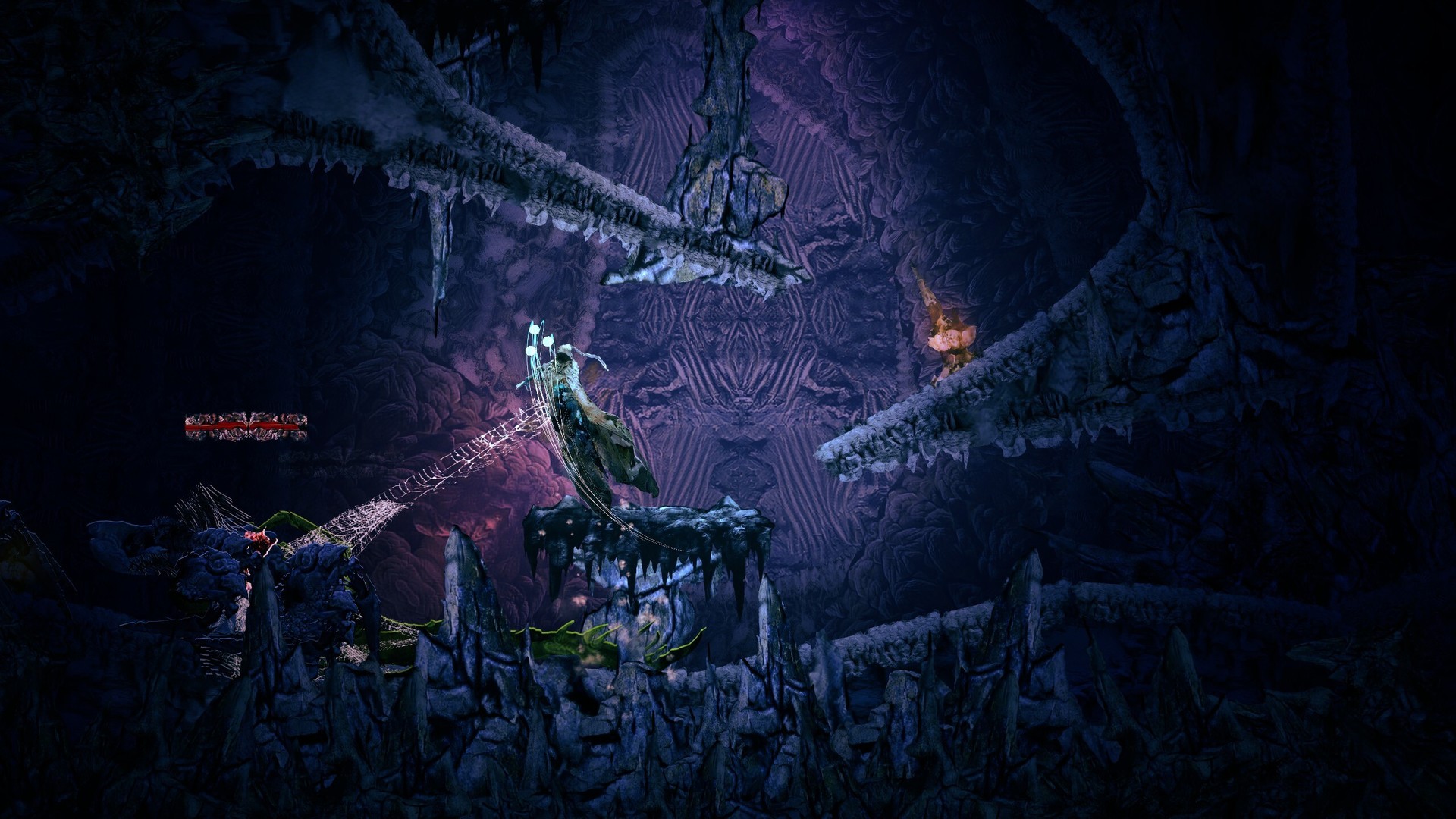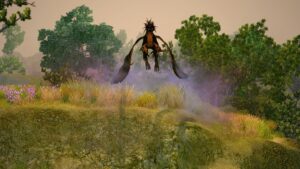
There are a lot of parts of Source of Madness, a sidescrolling roguelite from Carry Castle, that you’ve probably seen before, for better or worse. It’s a sidescrolling roguelite, for one, joining a crowded genre already defined by many of its unique and standout titles. On top of that, it’s deeply inspired by the aesthetic and themes of H.P. Lovecraft, taking much of the dark, distorted tone of ever-popular Lovecraftian media for its own. With that in mind, it’s difficult for Source of Madness to stand out amongst the crowd. It certainly has some unique and intriguing ideas of its own, particularly in its use of machine learning for enemy AI that complements its procedural generation, and it offers a grotesque aesthetic and somewhat deep gameplay system that allows for experimentation. However, while I enjoyed some moments from run to run and see potential in its randomness, I never got the feeling with Source of Madness that it fully capitalizes on any of its big ideas, and it’s neither cohesive nor unique enough to stand out.
While Source of Madness doesn’t immediately set itself apart, it has an intriguing, if familiar setup. You play as a series of Acolytes trying to fight through demons in a harrowing, unexplained world. There are people who are part of a cult standing around the starting castle who deliver short, mysterious sayings warning you of what lies beyond the castle and how they appeared. These people, alongside a brief Prologue sequence and a couple of cutscenes, set the stage for the game’s story. It’s a typical Lovecraftian affair of monsters, demons, and other atrocities that you need to slay to cleanse the world, but it’s more visually appealing than narratively interesting. While games like Hades take advantage of the roguelite framework to tell a compelling story, this story feels more like a background addition to set the stage for the gameplay and provide context rather than a deep integration of the two.
"While I enjoyed some moments from run to run and see potential in its randomness, I never got the feeling with Source of Madness that it fully capitalizes on any of its big ideas, and it’s neither cohesive nor unique enough to stand out."
The real gameplay begins when you step out of the castle and face the monsters head on. Similar to games like Rogue Legacy, each of your runs follows a different Acolyte, and each time you die you get to pick a new character with slightly different stats. Unlike Rogue Legacy, though, it takes a while for the changes in stats to become truly noticeable, as they are more focused on minor increases to overall health or elemental damage than with fundamental changes to gameplay. Although it does begin to change more significantly when you unlock later classes, I would have liked to see more differentiation between the choices from the jump. There are also multiple skill trees that constitute the title of roguelite and increase certain stats or item drops, and help progress you overall, especially when they allow you to increase the number of dashes at once or life regeneration vials at the start of each run.
Source of Madness’ gameplay, like most roguelites, hinges on the different occurrences within each run. Character builds are somewhat streamlined compared to others in the field, as you can have up to one piece of armor, two weapons, and a handful of active and passive boosts to your stats. Every piece of equipment feeds your overall stats, which include things like health, movement speed, and elemental damage and resistance, and are where the classes begin to have an effect, such as the Pyromancer’s higher damage with and resistance to fire. Much of the equipment feels familiar after a few runs, as there aren’t full armor sets or incredibly unique weapon types. Instead, it focuses on differences in elements and a handful of attack speeds.
You can, for example, get a ring that performs a very fast melee Slash attack and deals Arcane damage and use it in combination with one that shoots a big fireball and deals a ton of damage but can deal friendly fire and has a long cooldown. As someone who enjoys melee attacks more than ranged ones, I was disappointed in how frequently the ranged attack rings pop up, but usually the short-range rings pop up eventually. What this means is that unlike some other roguelikes and roguelites, you’re more likely going to gravitate toward a single playstyle, rather than adapting your playstyle to the equipment you get each run. While this is great for continuity, Source of Madness has a great number of different enemies and equipment, so it would have been enjoyable to play around with the loadouts with more effect.
"Unlike some other roguelikes and roguelites, you’re more likely going to gravitate toward a single playstyle, rather than adapting your playstyle to the equipment you get each run."
The biggest source of overall differentiation between runs comes from Source of Madness’ procedural generation. Roguelikes and roguelites are built on procedural generation, and Source of Madness uses it for map layout and enemy creation, but it also utilizes neural network AI for enemy activity, attempting to react to your playstyle and become more difficult over time. The environments themselves are generally interesting to look at in all of their gory, grotesque ways. Each biome is laid out usually in one of a handful of ways with slight tweaks, though they can get somewhat labyrinthian and it’s easy to get lost if you’re not careful.
The enemies are less exciting. There are certainly many different variations of monsters, but aside from a few minibosses and the true bosses, they’re more variations of the same blob than they are different enemies entirely. The idea of machine learning is also a bit of a letdown, as enemies are more prone to ragdolling than making any nuanced changes in their activity. It’s more common that they will barrel at you or come flying out of the sky than show any kind of real strategy, and I didn’t ultimately notice that enemies really adapted to my playstyle in particular.
At the same time, enemy unpredictability makes it very difficult to anticipate anything they can or will do, and this is where the gameplay of Source of Madness begins to lose me. Enemies’ move sets change so frequently that it’s virtually impossible to learn their moves like you would in other comparable games, and because all of the enemies look so much like a big demon blob, it’s often very difficult to determine where you are or what’s really happening on screen, especially when multiple enemies are attacking at once. I found myself mashing buttons to perform my attacks as quickly as possible because it was more effective than trying to strategically aim. Gameplay itself is also floaty and imprecise, so even if I have my favorite loadout, it’s often difficult to say where my next projectile will reach or where I will land on my next jump.
"Source of Madness falls short of the roguelite ideal of getting progressively better with each run. It’s often brutally difficult, but unlike other brutally difficult games, I didn’t end up feeling like every death was a learning experience."
Because of that, Source of Madness falls short of the roguelite ideal of getting progressively better with each run. It’s often brutally difficult, but unlike other brutally difficult games, I didn’t end up feeling like every death was a learning experience. I didn’t understand why so many of the deaths were happening, and there was no way for me to understand what attacks an enemy would come at me with or where I needed to move to get out of the way. It’s because of this that gameplay starts to get more frustrating than rewarding at certain times. Making your way through a boss for the first time is certainly a satisfying experience, but I again noticed it happen more because I got lucky than because I really made progress with the game’s mechanics, and it’s more common that you’ll have a frustrating death than a real battle with a tough enemy.
On the whole, Source of Madness doesn’t provide enough of the benefits of a roguelite to stand out from a crowded field of its peers. While it has some good ideas to take influence from other games and media to build in a new take on procedural generation, it doesn’t nail the core gameplay, nor does it really capitalize on the strengths of its new ideas. The act of playing Source of Madness is a lot less exciting than the ideas behind it, and while I think there are building blocks for the future, there isn’t enough of a reason to recommend it over other, better roguelites.
This game was reviewed on the Xbox Series X.
Cool machine learning idea; Beautiful and harrowing environments; Good weapon variety.
Unpredictable enemies; Lack of a feeling of progression; Brutal difficulty without the payoff; Unintelligible story.


















